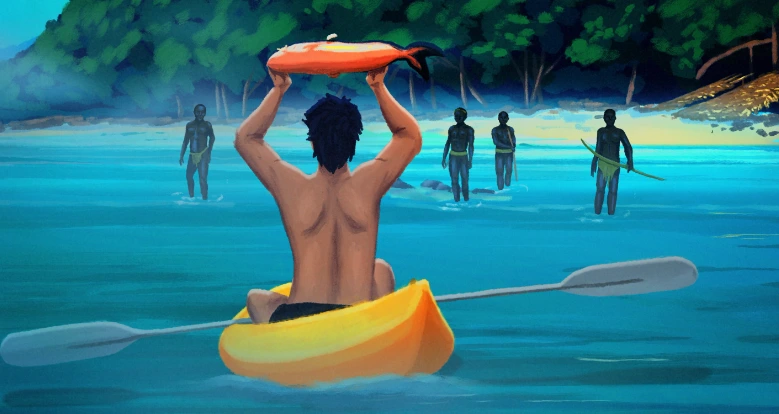
Film Review: The Mission
Film Reviews
The Mission
Directors: Amanda McBaine, Jesse Moss
Lightbox and Mile End Films
In Theaters: 10.27
Truth is stranger than fiction, especially in a world divided by staunch viewpoints on the fundamental truth of the nature of humankind, its origins and its purpose on earth. The Mission, a new National Geographic documentary, is a sobering study of right and wrong, and the question of who gets to decide those distinctions.
In 2018, 26-year-old American Evangelical missionary John Allen Chau set out on a self-planned, clandestine, commando mission to preach the Gospel of Jesus Christ to the Indigenous Sentinelese people of the Andaman Islands off the coast of India, who are one of the last civilizations living in total voluntary insolation from the outside world. Chau was never seen alive again, and his body has never been recovered. The young missionary’s journals tell the story of a man who was certain that he was doing God’s will in bringing the divine truth to “Satan’s last stronghold,” where he believed that the people were denied the opportunity to learn of Christ and choose whether or not to accept him as their savior.
Was John driven by selfless love or dangerous hubris? The film intertwines John’s written accounts and those of his devastated father, Patrick Chau, recounting their respective stories through animation and voice overs performed by Laurence Kao (Fistful of Vengeance) as John and David Shih (Billions) as Patrick. The filmmakers also interview some of John’s closest friends as well as historian Adam Goodheart and former-missionary-turned-atheist Daniel Everett, both of whom have lived on the Andaman Islands and have personal experience with the people of the region. Through these personal testimonies, the film peels back the layers of John’s plan and his fervent beliefs as it examines the histories of Christian missionary work and colonialism.
Amanda McBaine and Jesse Moss, the directing team behind the acclaimed 2020 documentary Boys State, manage to take an up-close and personal approach to a story that inherently orients the audience as outsiders, as their film’s protagonist is deceased and its most intriguing subjects remain almost entirely unknown. The animated segments, as well as video footage and snippets from his social media, get us as far into John’s head and heart as it’s possible to get, and he’s a deeply infuriating, genuinely endearing and ultimately tragic figure. John’s mission was objectively illegal and arguably self serving and aggrandizing. At the same time, the film dives deeply enough into the religious world and the missionary mindset that it’s difficult not to feel drawn to John’s unshakable belief in the righteousness of his endeavor, and whether his faith was based in a higher truth or oppressive superstition, there’s no denying that he was a person of passion and deep convictions.
While the film avoids taking sides, it deals heavily with the othering and dehumanizing of the Sentinelese people and other civilizations living a more isolated existence—even daring National Geographic itself to take responsibility for the role it played in stigmatizing and creating a flawed, popular narrative on such tribes. The contradiction of a society that believes we must intervene and teach modern ways to people who we view as primitive, while a key element of that is predicated on imposing a governing sense of morality dictated by a blind devotion to ancient mythology, is enough to make your head spin. Still, McBaine and Moss wisely avoid picking a side on the question of God and focus on the human drama of a young man who was so driven by an obsession that he died for it, as well as the anguish of a father who can’t forgive himself for not understanding his son well enough to stop him.
The Mission is thought provoking, uncomfortable and thoroughly unforgettable, and you need not ascribe to or reject any theology to become immersed. It’s a great film that asks a lot of deep questions and seeks answers without an agenda to vilify anyone or completely dismiss any viewpoints, and it’s a journey that is well worth taking. –Patrick Gibbs
Read more film reviews on thought-provoking topics:
Damn These Heels! Film Review: 1946: The Mistranslation That Shifted Culture
Film Review: The Creator
